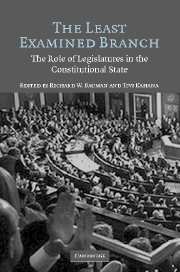Book contents
- Frontmatter
- Contents
- Foreword: Legislatures in the Constitutional State by Amy Gutmann
- Contributors
- New Ways of Looking at Old Institutions
- PART ONE LEGISLATURES AND DEMOCRATIC THEORY
- PART TWO LEGISLATING AND DELIBERATING IN THE DEMOCRATIC LEGISLATURE
- PART THREE CONSTITUTION MAKING BY LEGISLATURES: THE EXPLICIT VERSION
- PART FOUR CONSTITUTION MAKING BY LEGISLATURES: THE IMPLICIT VERSION
- PART FIVE CONSTITUTIONAL INTERPRETATION AND APPLICATION BY THE LEGISLATURE
- PART SIX IS LEGISLATIVE CONSTITUTIONALISM POSSIBLE?
- 20 Democratic Decision Making as the First Principle of Contemporary Constitutionalism
- 21 Legislative Constitutionalism in a System of Judicial Supremacy
- 22 Between Supremacy and Exclusivity
- 23 Legislatures as Rule-Followers
- 24 Popular Revolution or Popular Constitutionalism? Reflections on the Constitutional Politics of Quebec Secession
- PART SEVEN THE LEGISLATURE IN DIALOGUE: DOMESTIC AND INTERNATIONAL CONTEXTS
- Index
23 - Legislatures as Rule-Followers
Published online by Cambridge University Press: 06 August 2009
- Frontmatter
- Contents
- Foreword: Legislatures in the Constitutional State by Amy Gutmann
- Contributors
- New Ways of Looking at Old Institutions
- PART ONE LEGISLATURES AND DEMOCRATIC THEORY
- PART TWO LEGISLATING AND DELIBERATING IN THE DEMOCRATIC LEGISLATURE
- PART THREE CONSTITUTION MAKING BY LEGISLATURES: THE EXPLICIT VERSION
- PART FOUR CONSTITUTION MAKING BY LEGISLATURES: THE IMPLICIT VERSION
- PART FIVE CONSTITUTIONAL INTERPRETATION AND APPLICATION BY THE LEGISLATURE
- PART SIX IS LEGISLATIVE CONSTITUTIONALISM POSSIBLE?
- 20 Democratic Decision Making as the First Principle of Contemporary Constitutionalism
- 21 Legislative Constitutionalism in a System of Judicial Supremacy
- 22 Between Supremacy and Exclusivity
- 23 Legislatures as Rule-Followers
- 24 Popular Revolution or Popular Constitutionalism? Reflections on the Constitutional Politics of Quebec Secession
- PART SEVEN THE LEGISLATURE IN DIALOGUE: DOMESTIC AND INTERNATIONAL CONTEXTS
- Index
Summary
It is the signal achievement of Magna Carta to have established that even the king is subject to the law. Although a now-scorned account of law sees it as consisting in the commands from sovereign to subject, after Magna Carta it is commonplace that the sovereign stands not above the law, but rather as part of it and under it. And now that the notion of a unitary sovereign has in most societies yielded to a more complex understanding of the role and status of government, the legacy of Magna Carta can be appreciated, in part, as the widely accepted proposition that no part of government – neither legislature nor executive nor judiciary nor bureaucracy nor military – is above the law.
Yet although the proposition that government is not above the law will attract little dissent, the question of just what it means to say that government is not above the law is considerably more complex. Least controversially, the view that government is not above the law means that individuals who hold government positions are as subject as any other citizen to the laws of general application. Principles of diplomatic immunity may allow ambassadors to park with impunity in the vicinity of United Nations headquarters, but there exists no parallel principle of general governmental immunity that serves to immunize, except under rare circumstances, the actions of governmental officials from the ordinary application of ordinary law.
- Type
- Chapter
- Information
- The Least Examined BranchThe Role of Legislatures in the Constitutional State, pp. 468 - 479Publisher: Cambridge University PressPrint publication year: 2006
- 1
- Cited by

